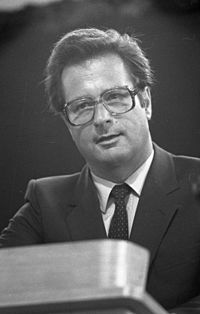
Back Klaus Kinkel Afrikaans Klaus Kinkel ALS كلاوس كينكل Arabic كلاوس كينكل ARZ Klaus Kinkel Azerbaijani Клаус Кінкель Byelorussian Клаус Кинкел Bulgarian Klaus Kinkel Catalan Klaus Kinkel Czech Klaus Kinkel Danish
Klaus Kinkel | |
|---|---|
 Kinkel as President of the Federal Intelligence Service in 1982 | |
| Vice Chancellor of Germany | |
| In office 21 January 1993 – 26 October 1998 | |
| Chancellor | Helmut Kohl |
| Preceded by | Jürgen Möllemann |
| Succeeded by | Joschka Fischer |
| Leader of the Free Democratic Party | |
| In office 11 June 1993 – 10 June 1995 | |
| Preceded by | Otto Graf Lambsdorff |
| Succeeded by | Wolfgang Gerhardt |
| Minister of Foreign Affairs | |
| In office 18 May 1992 – 26 October 1998 | |
| Chancellor | Helmut Kohl |
| Preceded by | Hans-Dietrich Genscher |
| Succeeded by | Joschka Fischer |
| Minister of Justice | |
| In office 18 January 1991 – 18 May 1992 | |
| Chancellor | Helmut Kohl |
| Preceded by | Hans A. Engelhard |
| Succeeded by | Sabine Leutheusser-Schnarrenberger |
| President of the Federal Intelligence Service | |
| In office 1 January 1979 – 26 December 1982 | |
| Chancellor | Helmut Schmidt Helmut Kohl |
| Preceded by | Gerhard Wessel |
| Succeeded by | Eberhard Blum |
| Member of the Bundestag for North Rhine-Westphalia | |
| In office 10 November 1994 – 17 October 2002 | |
| Preceded by | multi-member district |
| Succeeded by | multi-member district |
| Constituency | FDP List |
| Personal details | |
| Born | 17 December 1936 Metzingen, Nazi Germany |
| Died | 4 March 2019 (aged 82) Sankt Augustin, Germany |
| Political party | Free Democratic Party (1991–2019) |
| Spouse |
Ursula Kinkel (m. 1962) |
| Children | 4 |
| Residence | Sankt Augustin |
| Alma mater | University of Tübingen (no degree) University of Bonn University of Cologne (Dr. iur.) |
| Occupation |
|
Klaus Kinkel (17 December 1936 – 4 March 2019)[1] was a German statesman, civil servant, diplomat and lawyer who served as the minister of Foreign affairs (1992–1998) and the vice chancellor of Germany (1993–1998) in the government of Helmut Kohl.
Kinkel was a career civil servant and a longtime aide to Hans-Dietrich Genscher, and served as his personal secretary in the Federal Ministry of the Interior from 1970 and in senior roles in the Foreign Office from 1974. He was President of Federal Intelligence Service from 1979 to 1982 and a state secretary in the Federal Ministry of Justice from 1982 to 1991. In 1991 he was appointed as the Federal Minister of Justice and joined the liberal Free Democratic Party (FDP) shortly after. In 1992 he became Foreign Minister, and in 1993 he also became the Vice Chancellor of Germany and the leader of the Free Democratic Party. He left the government in 1998 following its electoral defeat. Kinkel was a member of the Bundestag from 1994 to 2002, and was later active as a lawyer and philanthropist.
During his brief tenure as Minister of Justice he pressed for the extradition and criminal prosecution of deposed East German dictator Erich Honecker and sought to end the left-wing terrorism of the Red Army Faction. As Foreign Minister he is regarded as one of the most influential European politicians of the 1990s. He personified an "assertive foreign policy", increased Germany's peacekeeping engagements overseas, was at the forefront among Western leaders of building a relationship with Boris Yeltsin's newly democratic Russian Federation and pressed for Germany to be given a permanent seat on the UN Security Council. He also championed the Maastricht Treaty, the merging of the Western European Union with the EU to give the EU an independent military capability and the expansion of the EU.[2] Kinkel played a central role in the efforts to resolve the Yugoslav Wars of the 1990s, and proposed the creation of the International Criminal Tribunal for the former Yugoslavia.[3]
- ^ Prägende Figur der FDP – Ex-Außenminister Klaus Kinkel ist tot, ZDF 5. March 2019
- ^ Obituaries, Telegraph (6 March 2019). "Klaus Kinkel, high-profile German foreign minister after reunification, who had earlier led West Germany's intelligence agency – obituary". The Telegraph – via www.telegraph.co.uk.
- ^ Hazan, Pierre (2004). Justice in a Time of War: The True Story Behind the International Criminal Tribunal for the Former Yugoslavia. College Station: Texas A&M University Press. ISBN 1585443778.
© MMXXIII Rich X Search. We shall prevail. All rights reserved. Rich X Search